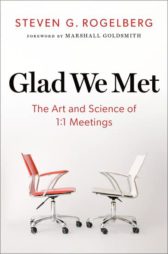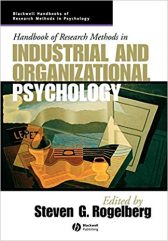Glad We Met: The Art and Science of 1:1 Meetings
Would it surprise you to know? Nearly half of 1:1s are rated as being suboptimal That managers believe their 1:1s went better than their direct reports That poorly ...
Would it surprise you to know?
- Nearly half of 1:1s are rated as being suboptimal
- That managers believe their 1:1s went better than their direct reports
- That poorly conducted 1:1s can derail employee engagement, thriving, and inclusion
- That 1:1s are arguably the most important tool for building genuine connections and retaining employees. This is true especially in hybrid work environments
- That directs can engage in 5 particular behaviors that can serve to elevate the 1:1
- Apart from the potential to critically influence productivity, retention, alignment, relationship and development outcomes for directs, successful 1:1s can elevate manager success and allow them to re-capture valuable time
- There is a robust science to help us navigate key 1:1 decisions around cadence, agenda creation, the types of questions to ask, and what a leader and direct report needs to do assure a constructive and valuable experience.
There are approximately 200 million 1:1 meetings a day around the globe. Yet, the research clearly shows that 1) the effectiveness of these meetings is far from optimal; 2) that when managers self-rate their skills in conducting these meetings, it is inflated and does not align with their directs’ ratings and 3) that directs can, but often fail to, play a key role in assuring success. Hence, an incredible opportunity exists to fill the skills gap and maximize return of a tremendous time investment.
1:1s could be one of the most crucial meeting types for the success of team members, managers, teams, and organizations. The best managers recognize that 1:1s are not an add-on to their role as a manager—conducting 1:1s proficiently IS foundational to being a manager. Equally critical, the most successful employees recognize that they have the ability to shape the 1:1 to assure their work and personal needs are met. When a manager and direct report fully embrace this, the potential of 1:1s for transforming people and teams can be realized. Successful 1:1s positively affect day-to-day activities through discussion of productivity blockers, coordination, and alignment. And, they are also so much more. Namely, these meetings fundamentally influence a direct report’s experience at work, including how they engage and attach to their role, perceive the effectiveness of their manager as a leader, and envision their future at the organization. 1:1s also promote manager success. Specifically, effective 1:1s result in more focused, engaged, aligned, and successful team members. A managers’ success/performance hinges on the achievements of those they lead. 1:1s fill managers’ calendars, but meaningful guidance on how to conduct them effectively is quite sparse. The goal of this session is to encourage you to realize the full potential of every 1:1 meeting, without feeling like you are just wallowing in wasted meeting time. It highlights what managers and direct reports can do to assure success in these critical meetings.
Drawing from over 20 years of research and evidence Dr. Steven Rogelberg collected from leaders, directs, and c-suite leaders in some of the most respected companies in the world, the topics covered in this session include:
- Why effective 1:1s are critical to your success and the success of your team –contrasting with ad hoc meeting approaches
- Keys to success and 10 common mistakes to avoid from both the manager and direct report perspective.
- Messaging and positioning 1:1s for maximum value
- Finding the correct 1:1 cadence and meeting length to maximize positive impact without over-meeting
- Managing the intricate balance of productivity-building, relationship-building, and employee development
- Designing 1:1s with intentionality, from where to conduct the meeting (e.g., virtual) to building agendas to optimize effectiveness
- How to evaluate if your 1:1s are actually working as hoped.Importantly, while this session focuses on the manager/direct report 1:1, learnings are also highly relevant to 1:1s with peers, customers, and skip-levels.




